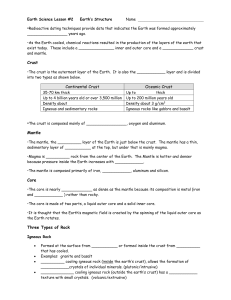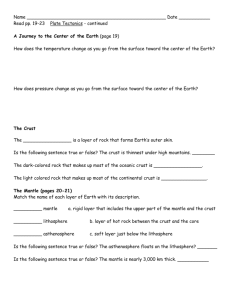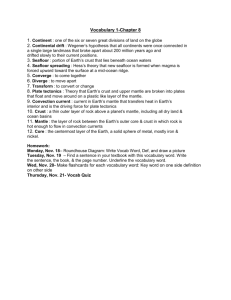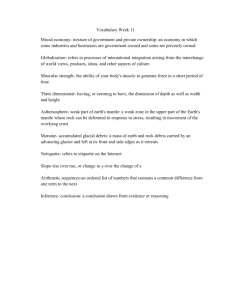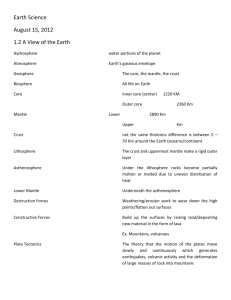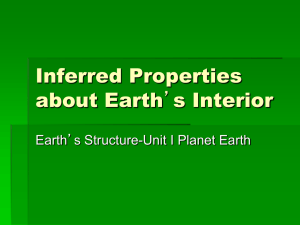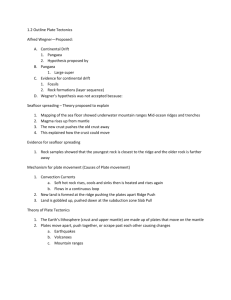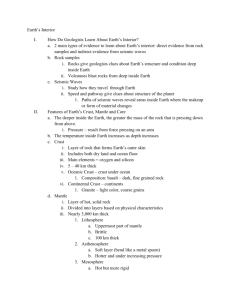Elemental Geosystems, 5e - Cal State LA
advertisement
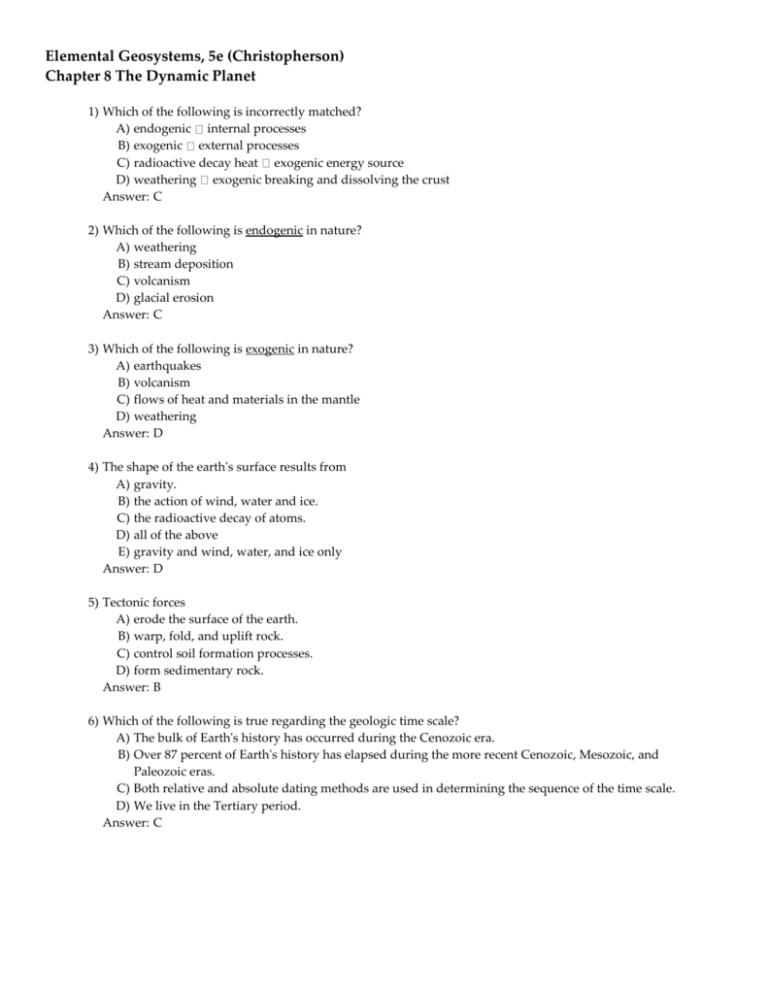
Elemental Geosystems, 5e (Christopherson) Chapter 8 The Dynamic Planet 1) Which of the following is incorrectly matched? A) endogenic internal processes B) exogenic external processes C) radioactive decay heat exogenic energy source D) weathering exogenic breaking and dissolving the crust Answer: C 2) Which of the following is endogenic in nature? A) weathering B) stream deposition C) volcanism D) glacial erosion Answer: C 3) Which of the following is exogenic in nature? A) earthquakes B) volcanism C) flows of heat and materials in the mantle D) weathering Answer: D 4) The shape of the earth's surface results from A) gravity. B) the action of wind, water and ice. C) the radioactive decay of atoms. D) all of the above E) gravity and wind, water, and ice only Answer: D 5) Tectonic forces A) erode the surface of the earth. B) warp, fold, and uplift rock. C) control soil formation processes. D) form sedimentary rock. Answer: B 6) Which of the following is true regarding the geologic time scale? A) The bulk of Earth's history has occurred during the Cenozoic era. B) Over 87 percent of Earth's history has elapsed during the more recent Cenozoic, Mesozoic, and Paleozoic eras. C) Both relative and absolute dating methods are used in determining the sequence of the time scale. D) We live in the Tertiary period. Answer: C 7) Which of the following lists the correct sequence of divisions in the geologic time scale, from largest to smallest? A) era, eon, epoch, period B) eon, era, period, epoch C) epoch, era, eon, period D) period, eon, era, epoch Answer: B 8) Which of the following lists is in the correct sequence from youngest to oldest? A) Holocene, Pleistocene, Pliocene, Miocene B) Holocene, Precambrian, Cenozoic C) Paleozoic, Cenozoic, Mesozoic D) Tertiary, Quaternary, Cretaceous Answer: A 9) When geologists or archaeologists dig downward into a unit of rock or sediment, they are digging "back in time." This fact is based on the principle of ________. A) uniformitarianism B) superposition C) catastrophism Answer: B 10) Which of the following is not an example of an age-relationship based on absolute dating? A) The oldest known rocks on Earth are 3.96 billion years old. B) The Vishnu schist at the bottom of the Grand Canyon is 2 billion years old. C) The dinosaurs became extinct 65 million years ago. D) The Coconino formation in the Grand Canyon is older than the Kaibab formation. Answer: D 11) Uniformitarianism assumes that A) Earth is quite young and is shaped by dramatic events. B) catastrophic episodes have regularly occurred. C) the same physical processes we see today are a key to understanding the processes that have been operating throughout geologic time. D) mountains, plains, and canyons formed by catastrophic events. Answer: C 12) The idea that Earth formed only a few thousand years ago is A) basically accepted today by science. B) based on little physical evidence and is more appropriately considered a belief. C) referred to as uniformitarianism. D) the basis of the geologic time scale. Answer: B 13) Earth's interior is A) evenly mixed throughout. B) not subject to internal differentiation. C) heated unevenly by the heat of radioactive decay. D) arranged with lighter elements toward the center and heavier elements toward the crust. Answer: C 14) Knowledge of Earth's interior is derived from A) direct sampling of the interior using deep-test wells. B) work in Earth's deepest caverns and caves. C) indirect evidence involving the analysis of seismic waves. D) historic and prehistoric records. Answer: C 15) The heat that melted the early Earth was derived from A) nuclear fusion. B) radioactive decay. C) chemical reactions. D) sunlight. Answer: B 16) Which of the following gives the correct sequence of layers in the earth, from the surface to the center? A) crust, core, lower mantle, aesthenosphere B) aesthenosphere, lower mantle, crust, core C) crust, lower mantle, aesthenosphere, core D) crust, aesthenosphere, lower mantle, core Answer: D 17) Which of the following can occur when seismic waves encounter a layer in the earth's interior? A) They can be reflected or refracted. B) They can be absorbed. C) Their speed can change. D) All of the above can occur, depending upon the nature of the layer. E) None of the above seismic waves cannot penetrate below the crust of the earth. Answer: D 18) Which of the following statements about Earth's core is not true? A) It is composed primarily of iron. B) The inner core is believed to be liquid and the outer core solid. C) Temperatures in the core reach several thousand degrees. D) Temperatures and pressures are higher in the inner core than in the outer core. Answer: B 19) Approximately 90 percent of Earth's magnetic field is generated in the A) inner core. B) outer core. C) lower mantle. D) upper mantle. Answer: B 20) Earth's magnetic field A) is variable, and it has phased to zero some nine times during the past 4 million years. B) is constant in its intensity. C) remains a mystery as to its cause. D) is principally generated in the inner core. Answer: A 21) Which of the following is not true regarding Earth's magnetic field? A) It causes magnetic particles in cooling magma to align with magnetic field lines. B) Transition periods, during which reversals occur, last an average of about 4000 to 8000 years. C) The earth's magnetic field will probably reverse in the next few thousand years. D) A given field orientation can last billions of years. Answer: D 22) The transition zone from the outer core to the mantle is ________ and is known as the ________ discontinuity. A) uneven; Gutenberg B) uneven; Moho C) smooth; Gutenberg D) smooth; Moho Answer: A 23) With increasing depth, the mantle becomes ________ due to greater ________. A) more plastic; pressures B) more plastic; temperatures C) stiffer; pressures D) stiffer; temperatures Answer: C 24) Which of the following gives the correct sequence of layers in the mantle, from bottom to top? A) lower mantle; upper mantle, aesthenosphere B) aesthenosphere, mantle, upper mantle C) upper mantle, aesthenosphere, mantle D) mantle, aesthenosphere, upper mantle Answer: A 25) The aesthenosphere can best be described as A) a rigid solid. B) a liquid. C) plastic-like. D) plasma-like. Answer: C 26) Which of the following is true of the aesthenosphere? A) It contains pockets of increased heat. B) It flows. C) It carries the crustal plates. D) All of these are true. E) None of these are true. Answer: D 27) The density of material below the Moho is ________ that above it. A) greater than B) less than C) the same as Answer: A 28) The boundary between the crust and the rest of the lithospheric upper mantle is a discontinuity known as the A) Gutenberg. B) mantle. C) Moho. D) lithospheric layer. Answer: C 29) Which layer of the planet forms 80 percent of Earth's total volume, and has an average density of 4.5 grams per cm2? A) continental crust B) oceanic crust C) mantle D) core Answer: C 30) The thickness of Earth's crust ranges from A) 5 km to 60 km (3 mi to 37 mi). B) 70 km to 250 km (43 mi to 155 mi). C) the surface to an unknown depth. D) the surface down to 2900 km (1800 mi). Answer: A 31) Continental crust is basically ________, whereas oceanic crust is basically ________. A) thin; thick B) basalt; granite C) granite; basalt D) sima; sial Answer: C 32) The majority of the earth's crust is composed of ________ rock. A) igneous B) metamorphic C) sedimentary D) carbonate Answer: A 33) The principles of buoyancy and balance, when applied to Earth's crust, helps us to explain fluctuations in Earth's outer crust, a property known as A) magnetism. B) Moho effect. C) isostasy. D) orogenesis. Answer: C 34) Glaciers that once covered the Hudson Bay area melted 8,000 years ago. As a result of this, the bay is gradually rising. In another 10,000 years or so, it will have risen above sea level and become dry. This process can best be considered an example of A) catastrophism. B) isostasy. C) accretion. D) orogenesis. Answer: B 35) Three types of rock-forming processes compose the A) tectonic cycle. B) rock cycle. C) hydrologic cycle. D) mineral cycle. Answer: B 36) Heat energy and new materials are brought to the surface from the interior by the A) tectonic cycle. B) rock cycle. C) hydrologic cycle. D) mineral cycle. Answer: A 37) Which of the following is not part of the hydrologic cycle? A) transportation B) erosion C) sedimentation D) radioactive decay Answer: D 38) What percent of the earth's crust is composed of only eight natural elements? A) 25 B) 50 C) 75 D) 99 Answer: D 39) The three most abundant elements in Earth's crust are A) rock, water, and tectonics. B) magnesium, potassium, and oxygen. C) iron, aluminum, and granite. D) oxygen, silicon, and aluminum. Answer: D 40) An element or combination of elements that forms an inorganic, natural compound is called a A) tectonic rock. B) granitic compound. C) mineral. D) molecule. Answer: C 41) Mafic minerals are ________ minerals. A) dark colored, high density B) dark colored, low density C) light colored, high density D) light colored, low density Answer: A 42) An assemblage of minerals bound together is called a A) granitic compound. B) mineral. C) molecule. D) rock. Answer: D 43) Which of the following is matched correctly? A) granite metamorphic B) basalt sedimentary C) magma lava D) sandstone igneous Answer: C 44) The major rocks of Earth's crust are classified into principal types based on A) element composition. B) mineral composition. C) three specific rock-forming processes, i.e., the manner in which they formed. D) relative and absolute locations. Answer: C 45) A rock transformed from any other rock through profound physical and/or chemical processes is referred to as A) sedimentary. B) metamorphic. C) igneous. D) ancient. Answer: B 46) Which of the following is an example of an intrusive, igneous rock? A) volcano B) pluton C) dome D) lava flow Answer: B 47) A batholith forms from A) intrusive igneous rock. B) extrusive igneous rock. C) metamorphic rock. D) sediment accumulation in a depression. Answer: A 48) The Sierra Nevada mountain range in California is an example of A) an extrusive igneous formation. B) a lava flow. C) an exposed batholith. D) a volcano. Answer: C 49) A laccolith is actually a large version of a ________. A) dike B) discontinuity C) sill D) batholith Answer: C 50) The mineral crystals in a sill would be ________ those in a lava flow. A) larger than B) smaller than C) the same size as Answer: A 51) The history of life on Earth is chronicled in which type of rock? A) igneous B) metamorphic C) sedimentary Answer: C 52) The size of sediment transported from an area and subsequently deposited is a function of A) the energy of the transporting agent. B) the relief of the area. C) the energy of the environment. D) all of these E) none of these Answer: D 53) Consider a beach environment with large, powerful waves breaking along the shore. Given the nature of this environment, which of the following sediments would be least likely to be deposited there? A) gravel and sand B) sand C) silt and clay Answer: C 54) A rock made of clay particles is most likely to have formed in which of the following environments? A) beach B) desert C) swamp Answer: C 55) If you were driving down the highway and saw mountains composed of layered strata, you could be confident that you were looking at A) sedimentary rocks. B) extrusive igneous rock. C) a shield volcano. D) batholiths or laccoliths. Answer: A 56) Salt is an example of ________ rock. A) sedimentary B) extrusive igneous C) metamorphic D) intrusive igneous Answer: A 57) The presence of 180-million-year-old salt domes in the Gulf Coast region of the U.S. indicates that A) the area was once volcanically active. B) the area was subjected to plate collisions, which caused metamorphism to occur. C) subsidence is now occurring due to the withdrawal of magma from the region. D) a sea used to cover the area but subsequently evaporated. E) None of these are indicated. Answer: D 58) Which of the following is not a sedimentary rock? A) sandstone B) bituminous coal C) marble D) shale Answer: C 59) Limestone is an example of which type of rock-forming process? A) sedimentary B) metamorphic C) igneous Answer: A 60) Coal is a fossil fuel formed from A) dead marine organisms. B) plants. C) metamorphosed mafic minerals. D) blue-green algae. Answer: B 61) The ancient roots of mountains are usually composed of ________ rocks. A) sedimentary B) metamorphic C) igneous Answer: B 62) Which of the following is not true of the metamorphism process? A) It can be accomplished by heat. B) It can be accomplished by pressure. C) It involves melting of the original rock. D) It can be accomplished by chemical processes. Answer: C 63) Marble is a familiar example of which type of rock? A) intrusive igneous B) metamorphic C) sedimentary D) extrusive igneous Answer: B 64) An unmetamorphosed dike could be composed of which of the following? A) granite B) sandstone C) obsidian D) gneiss Answer: A 65) Tilted layers of quartzite exposed in a mountain range indicate that A) the mountain was covered with water. B) sand was deposited on a steeply sloping surface, lithified, uplifted and then exposed at the surface. C) sand was deposited, lithified, metamorphosed, uplifted and exposed. D) limestone was deposited, lithified, metamorphosed, uplifted and exposed. Answer: C 66) Which of the following is the fuel for continental drift and plate tectonics? A) nuclear fusion B) radioactive decay C) solar energy D) chemical reactions in Earth's core Answer: B 67) Which of the following supports the continental drift concept? A) magnetic field patterns preserved in the rocks B) plant and animal fossil records C) radioactive decay dating of rocks on either side of a spreading center D) All of these support the theory. E) None of these is valid evidence of continental drift. Answer: D 68) Plate boundaries are associated with A) earthquakes. B) volcanoes. C) subduction. D) rifting. E) all of the above Answer: E 69) At which of the following locations is new ocean crust being formed? A) rift zones B) along collision zones between two continents C) along collision zones between two oceanic plates D) in trenches Answer: A 70) At which of the following locations does subduction occur? A) along collision zones between two continents B) at sea floor spreading zones C) above mantle hot spots D) along collision zones between continental and oceanic plates Answer: D 71) The ocean floor subducts under continents because A) the ocean floor has a lower density and therefore sinks more easily. B) the ocean floor is made of felsic minerals and is heavier than continental material. C) the ocean floor is made of mafic material and is therefore more dense than continental material. D) the weight of the continents is so great that they push the ocean floor material downward. E) both A and B Answer: C 72) The ocean floor is a maximum of about 200 million years in age because A) the earth is only 200 million years old. B) the ocean floor is pushed up onto continental material during plate collisions. C) the ocean floor subducts during plate collisions. D) hot spots continuously destroy the ocean floor. E) None of the above the ocean floor is 3.96 billion years old. Answer: C 73) Which of the following are located along the midocean ridges? A) volcanoes B) outcrops of granite C) old oceanic sediments D) evaporite deposits Answer: A 74) Several large, linear lakes are forming in East Africa. This is evidence of what process? A) rifting B) subduction C) compression D) isostatic uplift Answer: A 75) The magma that fuels and produces the volcanic activity around the Pacific Ring of Fire is derived from the A) magma extruded from rift zones that are developing along the Pacific Rim. B) rise of material that was melted in subduction zones along the Pacific margins. C) rise of magma from hot spots, such as those that formed the Hawaiian Islands. D) rise of magma along transform faults. Answer: B 76) The Hawaiian Islands were formed as a result of A) a rising plume of magma from the mantle. B) an oceanic-oceanic plate collision. C) a continental-oceanic plate collision. D) activity along a midocean ridge. Answer: A 77) Which of the following is true of divergent plate boundaries? A) Rifting occurs there. B) Tensional forces exist there. C) New ocean crust can be created there. D) all of these E) none of these Answer: D 78) Convergent plate boundaries are characteristic of A) sea-floor spreading centers. B) collision zones between plates. C) lateral motions of plates. D) all plate boundaries. Answer: B 79) Which of the following is incorrect relative to hot spots across Earth's surface? A) Hot spots can occur beneath both oceanic and continental crust. B) They remain relatively fixed in relationship to the migrating plates. C) They are responsible for the formation of the Hawaiian-Emperor Islands chain. D) Hot spot activity is unrelated to the formation of Iceland, which sits atop a sea-floor spreading ridge in the North Atlantic. Answer: D 80) Which of the following is not true of geothermal energy? A) It could be used everywhere. B) It's in use in Iceland, Japan, and California. C) Loss of aquifer pressure and groundwater drawdown can reduce production over time. D) It can be used to produce both heat and electricity. Answer: A 81) Pangaea is currently dated at A) 4.6 billion years ago. B) about half the timespan of Earth's existence. C) 225 to 200 million years ago. D) 65 million years ago. E) the beginning of the Holocene. Answer: C 82) The sea-floor spreading center that led to the formation of the Atlantic Ocean accelerated dramatically between A) 4.6 and 2 billion years ago. B) 465 and 225 million years ago. C) the end of the Pleistocene and today. D) 135 and 65 million years ago. Answer: D 83) Which of the following is not true? A) The Hawai'ian island chain will subduct in approximately 40 my. B) The newest Hawai'ian island, Lo'ihi, should reach the surface in around 10,000 years. C) Measured from the sea floor to its summit, Mauna Kea is the tallest mountain on Earth. D) The formation of the island of Hawai'i took less than 1 my. Answer: A 84) A guiding principle of Earth science is the principle of uniformitarianism as opposed to catastrophism. Answer: True False 85) The earth's interior has been mapped using seismic waves. Answer: True False 86) Earth's magnetic field is generated from within the entire planet, rather than in a specific region of Earth's interior. Answer: True False 87) The uppermost mantle is plastic-like, whereas the aesthenosphere is rigid. Answer: True False 88) The crust is thickest under mountains and thinnest under the oceans. Answer: True False 89) The principle of isostasy refers to the horizontal movement of Earth's plates in response to loading and unloading of weight, such as ice or sediment. Answer: True False 90) The geologic cycle is powered both by exogenic and endogenic energy systems. Answer: True False 91) An example of an intrusive igneous formation is a pluton. Answer: True False 92) Lithification refers to the cementation, compaction, and hardening of sediments. Answer: True False 93) Silt and clay are likely to be deposited in a beach environment. Answer: True False 94) Alfred Wegner's theory of continental drift was immediately accepted by the scientific community when it was proposed. Answer: True False 95) Earthquake and volcanic occurrences do not correlate well with crustal plate boundaries. Answer: True False 96) Any rock, either igneous or sedimentary, may be transformed into a metamorphic rock, by going through profound physical and/or chemical changes under increased pressure and temperature. Answer: True False 97) The ocean floor is created along midocean ridges. Answer: True False 98) The deepest places in the ocean are those in which rifting occurs. Answer: True False 99) Scientists recently succeeded in drilling through the crust to reach the mantle. Answer: True False 100) Rocks that solidify and crystallize from a molten state are called ________. They form from ________, which is molten rock beneath the surface. Magma is fluid, highly gaseous, and under tremendous pressure. It is either ________ into preexisting crustal rocks, known as country rock, or ________ onto the surface as ________. Answer: igneous; magma; intruded; extruded; lava
